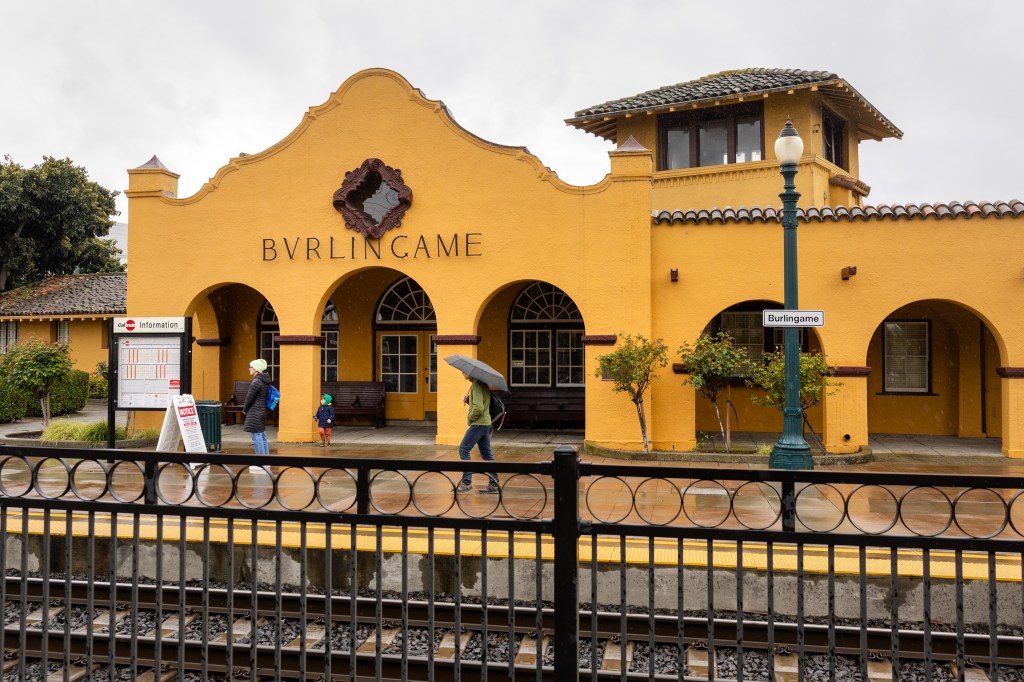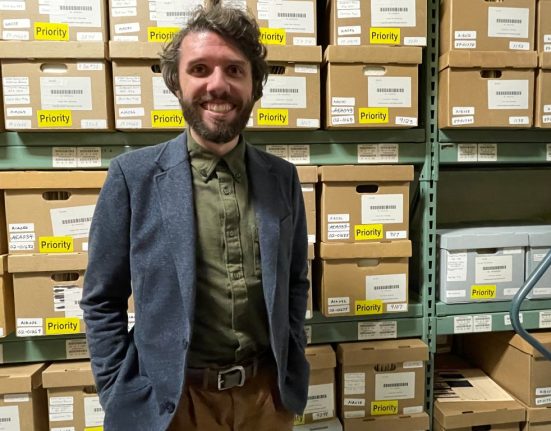REDWOOD CITY – A jury on Wednesday found a former Caltrain deputy director guilty of embezzling public funds to build a personal “crash pad” in a historic Burlingame train station, declining the defense’s argument that his supervisor had given him permission to put the funds toward renovating the apartment and residing there while working 80-hour weeks.
Joseph Navarro faced one felony count of misappropriation of public funds for turning a section of the Burlingame train station into an apartment, complete with a bedroom, a gym and a living room, prosecutors said at the trial. After several days of testimony and closing arguments on Tuesday, the jury began its deliberations Wednesday morning and came to a consensus in the afternoon.
The jury also found true that the charges were filed within the proper statute of limitations, which is three years of when the crime is discovered or should have been discovered. Defense lawyers had argued that the initial discovery should have meant the charges were filed too late.
“We’re very pleased that the jury was able to see through the defense and recognize that he had no authorization from anybody to build this little apartment there at the train station with taxpayer money,” San Mateo County District Attorney Stephen Wagstaffe in an interview after the verdict was announced. “The jury did the right thing in finding him guilty of the charge, we’re very grateful that they sat through this trial and rendered justice.”
Andrew Vandeveld, Navarro’s defense attorney, said after the verdict: “Obviously we’re disappointed with the outcome. We felt it had been established that he had been authorized to do the work and that the statute of limitations to bring the case expired long ago.”
Deputy District Attorney Joseph Cannon argued that Navarro was in charge of the public funds redirected to build the apartment, and that invoices were purposely kept under a $3,000 threshold so that they did not need further approval. Had Navarro gotten permission to construct the apartment — spending some $38,000 on construction at the station between 2019 and 2021 — there would have been a proposal and a paper trail, he said.
“This is a case about abuse of power and abuse of authority. … Mr. Navarro abused his authority as rail operations director in multiple ways, multiple times, affecting multiple people,” Cannon told the jury in his closing arguments. “His abuse of power did not just affect him.”
Cannon also argued that Navarro had instructed his co-defendant, Seth Worden, to keep the renovations quiet. Worden, who worked for Caltrain contractor TransAmerica Services, accepted a plea deal earlier this year for building an apartment in the Millbrae station.
“Turning a historic train station into your personal crash pad is 100% a conflict of interest,” Cannon said. “That’s just common sense.”
He also referenced the testimony of Navarro’s ex-girlfriend who stayed with him at the Burlingame station while recovering from a surgery — asking, “Who moves their girlfriend into their office if it’s a legitimate office?”
Vandeveld argued that Navarro had authorization to spend the funds — another employee testified that in 2019, Navarro’s direct supervisor, Michelle Bouchard, had asked, “How is the apartment coming at Burlingame?”.
Had Bouchard — who acknowledged in her testimony that she had the authority to control such renovations – not approved of the construction, she would have rebuked or punished Navarro once she knew, Vandeveld said. Bouchard stated in testimony that she never discussed the Burlingame apartment with Navarro, Vandeveld said, but he maintains that the testimony of the other employee “completely discredits her denial.”
“Asking for a status update? That’s consent,” Vandeveld said. “That’s a person in authority giving consent.”
He presented Navarro as a “dedicated railroad man” who worked 80-hour weeks and was the first to arrive on scene at railroad incidents no matter the time of day or night. He added that it was widely known that Navarro stayed overnight in his office.
“It takes a special commitment, and it takes a special sacrifice. Sacrifice of personal time, sacrifice of sleep,” Vandeveld said. “He was willing to give that sacrifice in exchange for proper operation of the railroad. He loved his job.”
Vandeveld added that keeping invoices under $3,000 was a general practice and was “nothing special” for the apartment. He also said that Worden’s story kept changing, and that, because Worden took a plea deal, if “he doesn’t say what the prosecution believes to be the truth, they have the opportunity to seek a higher sentence.”
Cannon pushed back on Vandeveld’s claim that Navarro had permission to build the apartment, questioning why he wouldn’t have stated he had permission when questioned by Caltrain.
“The first thing he would have done — any person would have done — is throw down the person who authorized it,” Cannon said. “But he doesn’t do that. Why? Because he was about to get fired, and he knew he didn’t have authorization to do it.”
While arguing over the statute of limitations, Vandeveld said that Caltrain did discover — or should have discovered — the apartment in 2019 because the invoices done for work at Burlingame were submitted, and the “invoices alone were enough to establish awareness for a reasonably diligent person.” He added that Navarro’s assistant had a key to the apartment sitting on her desk.
“This wasn’t a deep dark secret, a closed-off area, a secret chamber,” Vandeveld said. “This was information that was available.”
Navarro could face up to four years in state prison when he is sentenced June 11. Wagstaffe noted that the judge has a “range of discretion” and could also choose to give Navarro probation.
Originally Published:







